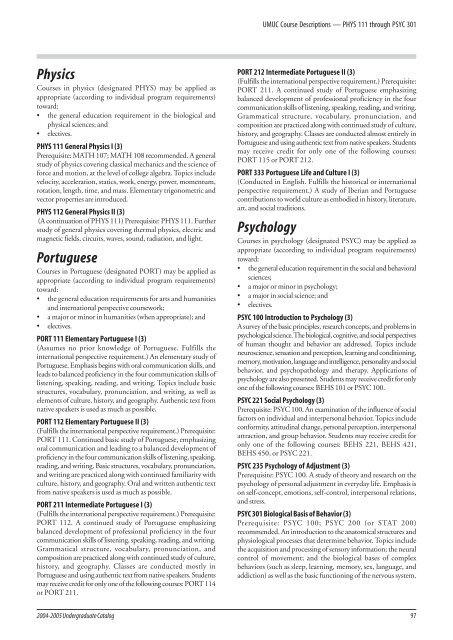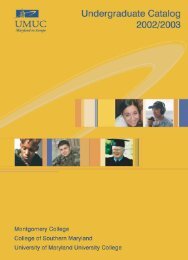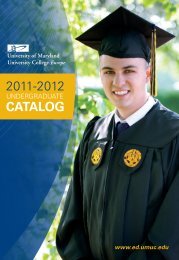Statements of Policy - UMUC Europe
Statements of Policy - UMUC Europe
Statements of Policy - UMUC Europe
You also want an ePaper? Increase the reach of your titles
YUMPU automatically turns print PDFs into web optimized ePapers that Google loves.
Physics<br />
Courses in physics (designated PHYS) may be applied as<br />
appropriate (according to individual program requirements)<br />
toward:<br />
• the general education requirement in the biological and<br />
physical sciences; and<br />
• electives.<br />
PHYS 111 General Physics I (3)<br />
Prerequisite: MATH 107; MATH 108 recommended. A general<br />
study <strong>of</strong> physics covering classical mechanics and the science <strong>of</strong><br />
force and motion, at the level <strong>of</strong> college algebra. Topics include<br />
velocity, acceleration, statics, work, energy, power, momentum,<br />
rotation, length, time, and mass. Elementary trigonometric and<br />
vector properties are introduced.<br />
PHYS 112 General Physics II (3)<br />
(A continuation <strong>of</strong> PHYS 111) Prerequisite: PHYS 111. Further<br />
study <strong>of</strong> general physics covering thermal physics, electric and<br />
magnetic fields, circuits, waves, sound, radiation, and light.<br />
Portuguese<br />
Courses in Portuguese (designated PORT) may be applied as<br />
appropriate (according to individual program requirements)<br />
toward:<br />
• the general education requirements for arts and humanities<br />
and international perspective coursework;<br />
• a major or minor in humanities (when appropriate); and<br />
• electives.<br />
PORT 111 Elementary Portuguese I (3)<br />
(Assumes no prior knowledge <strong>of</strong> Portuguese. Fulfills the<br />
international perspective requirement.) An elementary study <strong>of</strong><br />
Portuguese. Emphasis begins with oral communication skills, and<br />
leads to balanced pr<strong>of</strong>iciency in the four communication skills <strong>of</strong><br />
listening, speaking, reading, and writing. Topics include basic<br />
structures, vocabulary, pronunciation, and writing, as well as<br />
elements <strong>of</strong> culture, history, and geography. Authentic text from<br />
native speakers is used as much as possible.<br />
PORT 112 Elementary Portuguese II (3)<br />
(Fulfills the international perspective requirement.) Prerequisite:<br />
PORT 111. Continued basic study <strong>of</strong> Portuguese, emphasizing<br />
oral communication and leading to a balanced development <strong>of</strong><br />
pr<strong>of</strong>iciency in the four communication skills <strong>of</strong> listening, speaking,<br />
reading, and writing. Basic structures, vocabulary, pronunciation,<br />
and writing are practiced along with continued familiarity with<br />
culture, history, and geography. Oral and written authentic text<br />
from native speakers is used as much as possible.<br />
PORT 211 Intermediate Portuguese I (3)<br />
(Fulfills the international perspective requirement.) Prerequisite:<br />
PORT 112. A continued study <strong>of</strong> Portuguese emphasizing<br />
balanced development <strong>of</strong> pr<strong>of</strong>essional pr<strong>of</strong>iciency in the four<br />
communication skills <strong>of</strong> listening, speaking, reading, and writing.<br />
Grammatical structure, vocabulary, pronunciation, and<br />
composition are practiced along with continued study <strong>of</strong> culture,<br />
history, and geography. Classes are conducted mostly in<br />
Portuguese and using authentic text from native speakers. Students<br />
may receive credit for only one <strong>of</strong> the following courses: PORT 114<br />
or PORT 211.<br />
<strong>UMUC</strong> Course Descriptions — PHYS 111 through PSYC 301<br />
PORT 212 Intermediate Portuguese II (3)<br />
(Fulfills the international perspective requirement.) Prerequisite:<br />
PORT 211. A continued study <strong>of</strong> Portuguese emphasizing<br />
balanced development <strong>of</strong> pr<strong>of</strong>essional pr<strong>of</strong>iciency in the four<br />
communication skills <strong>of</strong> listening, speaking, reading, and writing.<br />
Grammatical structure, vocabulary, pronunciation, and<br />
composition are practiced along with continued study <strong>of</strong> culture,<br />
history, and geography. Classes are conducted almost entirely in<br />
Portuguese and using authentic text from native speakers. Students<br />
may receive credit for only one <strong>of</strong> the following courses:<br />
PORT 115 or PORT 212.<br />
PORT 333 Portuguese Life and Culture I (3)<br />
(Conducted in English. Fulfills the historical or international<br />
perspective requirement.) A study <strong>of</strong> Iberian and Portuguese<br />
contributions to world culture as embodied in history, literature,<br />
art, and social traditions.<br />
Psychology<br />
Courses in psychology (designated PSYC) may be applied as<br />
appropriate (according to individual program requirements)<br />
toward:<br />
• the general education requirement in the social and behavioral<br />
sciences;<br />
• a major or minor in psychology;<br />
• a major in social science; and<br />
• electives.<br />
PSYC 100 Introduction to Psychology (3)<br />
A survey <strong>of</strong> the basic principles, research concepts, and problems in<br />
psychological science. The biological, cognitive, and social perspectives<br />
<strong>of</strong> human thought and behavior are addressed. Topics include<br />
neuroscience, sensation and perception, learning and conditioning,<br />
memory, motivation, language and intelligence, personality and social<br />
behavior, and psychopathology and therapy. Applications <strong>of</strong><br />
psychology are also presented. Students may receive credit for only<br />
one <strong>of</strong> the following courses: BEHS 101 or PSYC 100.<br />
PSYC 221 Social Psychology (3)<br />
Prerequisite: PSYC 100. An examination <strong>of</strong> the influence <strong>of</strong> social<br />
factors on individual and interpersonal behavior. Topics include<br />
conformity, attitudinal change, personal perception, interpersonal<br />
attraction, and group behavior. Students may receive credit for<br />
only one <strong>of</strong> the following courses: BEHS 221, BEHS 421,<br />
BEHS 450, or PSYC 221.<br />
PSYC 235 Psychology <strong>of</strong> Adjustment (3)<br />
Prerequisite: PSYC 100. A study <strong>of</strong> theory and research on the<br />
psychology <strong>of</strong> personal adjustment in everyday life. Emphasis is<br />
on self-concept, emotions, self-control, interpersonal relations,<br />
and stress.<br />
PSYC 301 Biological Basis <strong>of</strong> Behavior (3)<br />
Prerequisite: PSYC 100; PSYC 200 (or STAT 200)<br />
recommended. An introduction to the anatomical structures and<br />
physiological processes that determine behavior. Topics include<br />
the acquisition and processing <strong>of</strong> sensory information; the neural<br />
control <strong>of</strong> movement; and the biological bases <strong>of</strong> complex<br />
behaviors (such as sleep, learning, memory, sex, language, and<br />
addiction) as well as the basic functioning <strong>of</strong> the nervous system.<br />
2004-2005 Undergraduate Catalog 97






